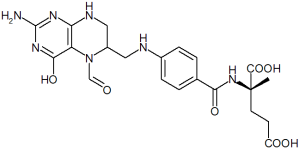Definition
Leucovorin (also known as Wellcovorin and citrovorum factor) is a drug that can be used either to protect healthy cells from chemotherapy or to enhance the anti-cancer effect of chemotherapy.
Purpose
Leucovorin is most often used in cancer patients who are taking either methotrexate or fluorouracil chemotherapy. Methotrexate is used to treat a wide range of cancers including breast cancer, head and neck cancers, acute leukemias, and Burkitt's lymphoma. Fluorouracil is used in combination with leucovorin to treat colorectal cancer. When leucovorin and methotrexate are used together, this therapy is often called leucovorin rescue because leucovorin rescues healthy cells from the toxic effects of methotrexate. In patients with colorectal cancer, however, leucovorin increases the anti-cancer effect of fluorouracil.
Leucovorin is also used to treat megaloblastic anemia, a blood disorder in which red blood cells become larger than normal, and to treat accidental overdoses of drugs like methotrexate.
Description
Leucovorin is a faster acting and stronger form of folic acid, and has been used for several decades. Folic acid is also known as vitamin B9, and is needed for the normal development of red blood cells. In humans, dietary folic acid must be reduced metabolically to tetrahydrofilic acid (THFA) to exert its vital biochemical functions. The coenzyme THFA and its subsequent other cofactors participate in many important reactions including DNA synthesis.
Leucovorin rescue
Some chemotherapy drugs, such as methotrexate (Mexate, Folex), work by preventing cells from using folic acid. Methotrexate therapy causes cancer cells to develop a folic acid deficiency and die. However, normal cells are also affected by folic acid deficiency. As a result, patients treated with drugs like methotrexate often develop blood disorders and other toxic side effects. When these patients are given leucovorin, it goes into normal cells and rescues them from the toxic effects of the methotrexate. Leucovorin cannot enter cancer cells, however, and they continue to be killed by methotrexate. Leucovorin also works by rescuing healthy cells in patients who take an accidental overdose of drugs similar to methotrexate.
Combination therapy
Patients with colorectal cancer are frequently treated with fluorouracil (Adrusil). Fluorouracil, commonly called 5-FU, is effective, but only works for a short time once it is in the body. Leucovorin enhances the effect of fluorouracil by increasing the time that it stays active. As a result, the combination of the two drugs produces a greater anti-cancer effect than fluorouracil alone.
Recommended dosage
Leucovorin can be given as an injection, intravenously, or as oral tablets. For rescue therapy, leucovorin is usually given intravenously or orally within 24 hours of methotrexate treatment. Dosage varies from patient to patient. When used in combination with fluorouracil, leucovorin is given to the patient intravenously first, followed by fluorouracil treatment. To treat unintentional folic acid antagonist overdose, leucovorin is usually given intravenously as soon as possible after the overdose. Patients with megaloblastic anemia receive oral leucovorin.
Precautions
Patients with anemia, or any type of blood disorder, should tell their doctor. Leucovorin can treat only anemia caused by folic acid deficiency. Patients with other types of anemia should not take leucovorin. The effect of leucovorin on the fetus is not known, and it is not known if the drug is found in breast milk. Leucovorin should therefore be used with caution during pregnancy. Elderly patients treated with leucovorin and fluorouracil for advanced colorectal cancer are at greater risk for developing severe side effects.
Side effects
The vast majority of patients do not experience side effects from leucovorin therapy. Side effects are usually caused by the patient's chemotherapy, not by leucovorin. In rare cases, however, some patients can develop allergic reactions to the drug. These include skin rash, hives, and itching.
Interactions
Although there are no listed drug interactions for leucovorin, patients should tell their doctor about any over the counter or prescription medication they are taking, particularly medication that can cause seizures.
KEY TERMS
- Folic acid
- Vitamin B9.
- Leucovorin rescue
- A cancer therapy where the drug leucovorin protects healthy cells from toxic chemotherapy.



